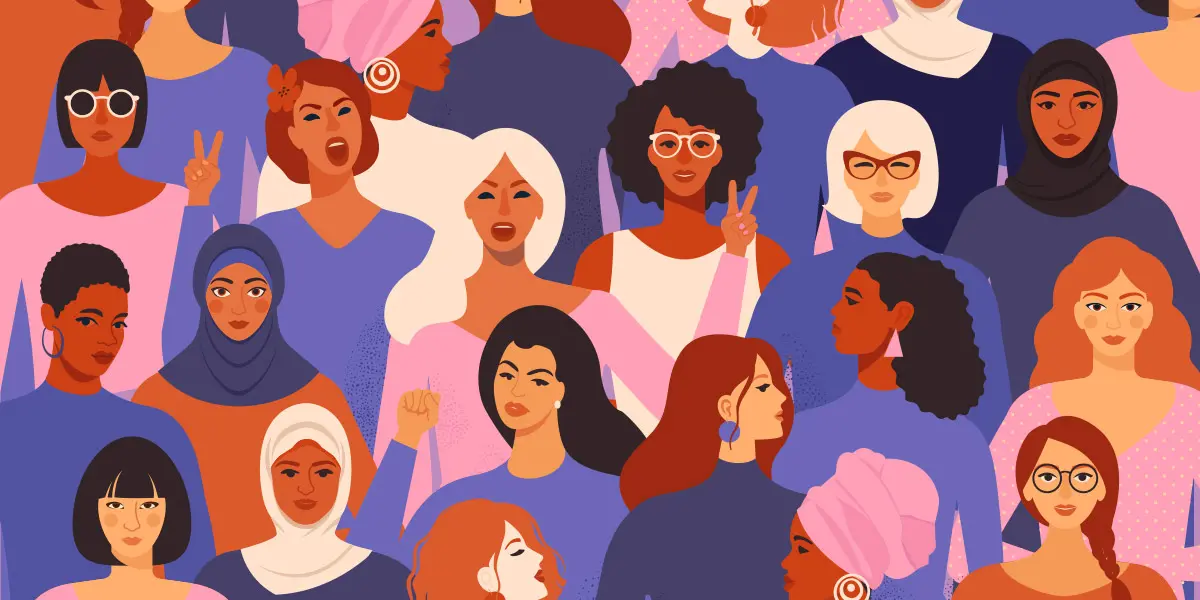Turning on the TV or reading the news, you will see feminism represented in black-and-white—supporters adopt the stance of unequivocal gender equality while detractors may argue that the patriarchy either does not exist or is not oppressive. However, feminism is not a unified ideology with one set of prescriptive solutions that can be supported or critiqued in blanket statements. Rather, it is an expansive movement, representing a patchwork of interests and perspectives as diverse as the experiences of the women who comprise it. Delving into the perspectives of liberal feminism, radical feminism, and intersectional feminism through the lens of sex work reveals the distinctions within feminist ideology and underscores the crucial need to employ an intersectional lens into feminist discourse. Feminism must encompass a broad spectrum of experiences and identities in order to be truly effective.
Liberal feminism emphasizes “the value of freedom” and focuses on personal agency. It operates within mainstream society, striving to integrate women into existing structures. Victories of liberal feminist theory, such as during the suffragette movement, “tend[ed] to rely on the state to gain equality—to see the state as the protector of individual rights.” Today, liberal feminists continues to center their advocacy around the idea that women should have the freedom to make their own choices, particularly in regards to issues like reproductive rights and equal pay.
Some liberal feminists believe sex work legalization would allow women greater autonomy in making their own choices. Consider Washington DC’s 2019 city council hearing on a bill that would decriminalize sex work. Proponents of the bill, often identifying as liberal feminists, argued for the decriminalization of sex work by asserting that consenting adults should have the right to engage in sex work without the threat of legal punishment, especially in an industry in which women are vastly overrepresented.
Radical feminists argue that liberal feminists’ emphasis on individual choice fails to challenge and overturn the systemic factors that sustain gender disparities. These feminists argue that gender roles and the patriarchy are so deeply ingrained in our culture that structural upheaval is necessary to rectify gender disparities. Julie Bindel—a radical feminist and “TERF” (trans-exclusionary radical feminist)—claims that liberal feminism has failed women, and that, according to its ideology, “[n]othing has to change, no challenge to the status quo is necessary and men do not need to be admonished. In other words, things stay the same and the quest for individual enlightenment and liberation becomes key.”
When it comes to sex work, radical feminists often take a critical stance. Some argue that the sex work industry is inherently oppressive to women as a manifestation of male dominance and exploitation. They contend that sex work is a product of the patriarchal system that objectifies and commodifies women’s bodies. Additionally, radical feminists argue that the liberal feminist critique of sex work does not address the underlying systemic issues that drive individuals into sex work, such as economic hardship, housing instability, and discrimination.
That one in five women on Skid Row have engaged in “survival sex” supports the view that individual choices cannot be evaluated absent their structural causes. However, many sex workers choose their professions voluntarily, raising questions about radical feminists’ limited view of agency. Moreover, as some liberal feminists argue, by characterizing all sex work as inherently exploitative, radical feminism may inadvertently contribute to the very oppression it seeks to combat. Blanket condemnation can lead to the marginalization of sex workers, making it difficult for them to access support, legal protections, or healthcare services. It can also perpetuate societal stigma, undermining sex workers’ efforts to engage in open discourse about their needs and rights.
Both radical and liberal feminists’ raise valid considerations about sex work. Their disagreements demonstrate that neither radical nor liberal feminism is fully adequate to embrace and empower all women. What these two perspectives on feminism are missing is a recognition of both the commonality and diversity of women’s experiences. This is where intersectionality comes in.
Intersectionality, a term coined by Kimberlé Crenshaw in 1989, is a framework for understanding how various systems of oppression—including but not limited to sexism and racism—intersect and compound the disadvantages faced by people with multiple marginalized identities. In the context of feminism, this lens is vital for addressing the multifaceted nature of gender inequality and acknowledging the diverse experiences of women.
The intricacies of sex work should not be reduced to a binary argument that promotes hostility, inflexibility, and oversimplified examination. A compelling illustration of the presence of intersectionality in sex work comes from a 1990 study in Dallas, which revealed that Black women face a unique form of marginalization due to the convergence of race and gender. Consequently, efforts to defend Black men against sexualized racist attacks can sometimes overshadow the challenges faced by Black women who experience violence at the hands of Black men. This has led Black women to “often [be] reluctant to embrace traditional feminist analyses of gender-based violence when doing so puts them at odds with the antiracist narrative of besieged Black masculinity.” As a result, Black women may not share their experiences out of fear of reinforcing racist stereotypes.
The issue of sex work serves as a crucial touchstone for understanding the differences between radical and liberal feminism. Most importantly, the discourse on sex work reveals how important an intersectional approach is to forging a feminist movement that unites diverse voices and works collectively to dismantle the multifaceted obstacles perpetuating gender-based inequality. Liberal feminism is not critical enough of the patriarchy’s structural roots, while radical feminism is so critical to the point where it may actually harm women’s empowerment because of its restrictiveness. An intersectional lens combines the best of these ideologies by accentuating how the individualized experiences of women converge with oppressive structures as well as their other identities.
